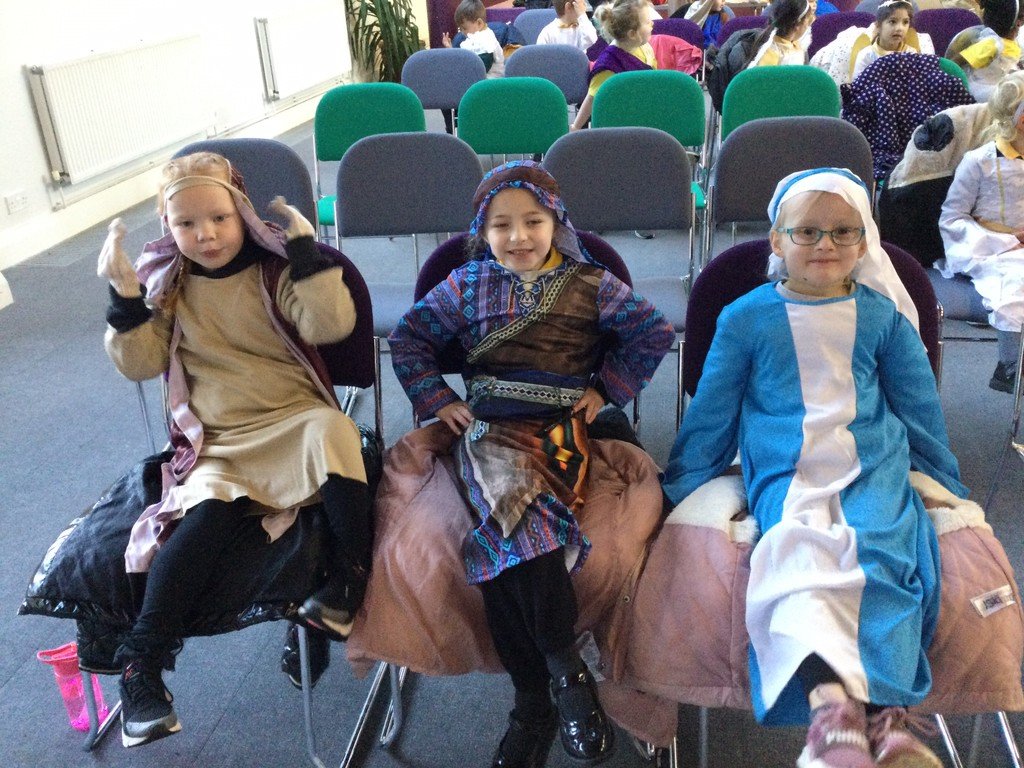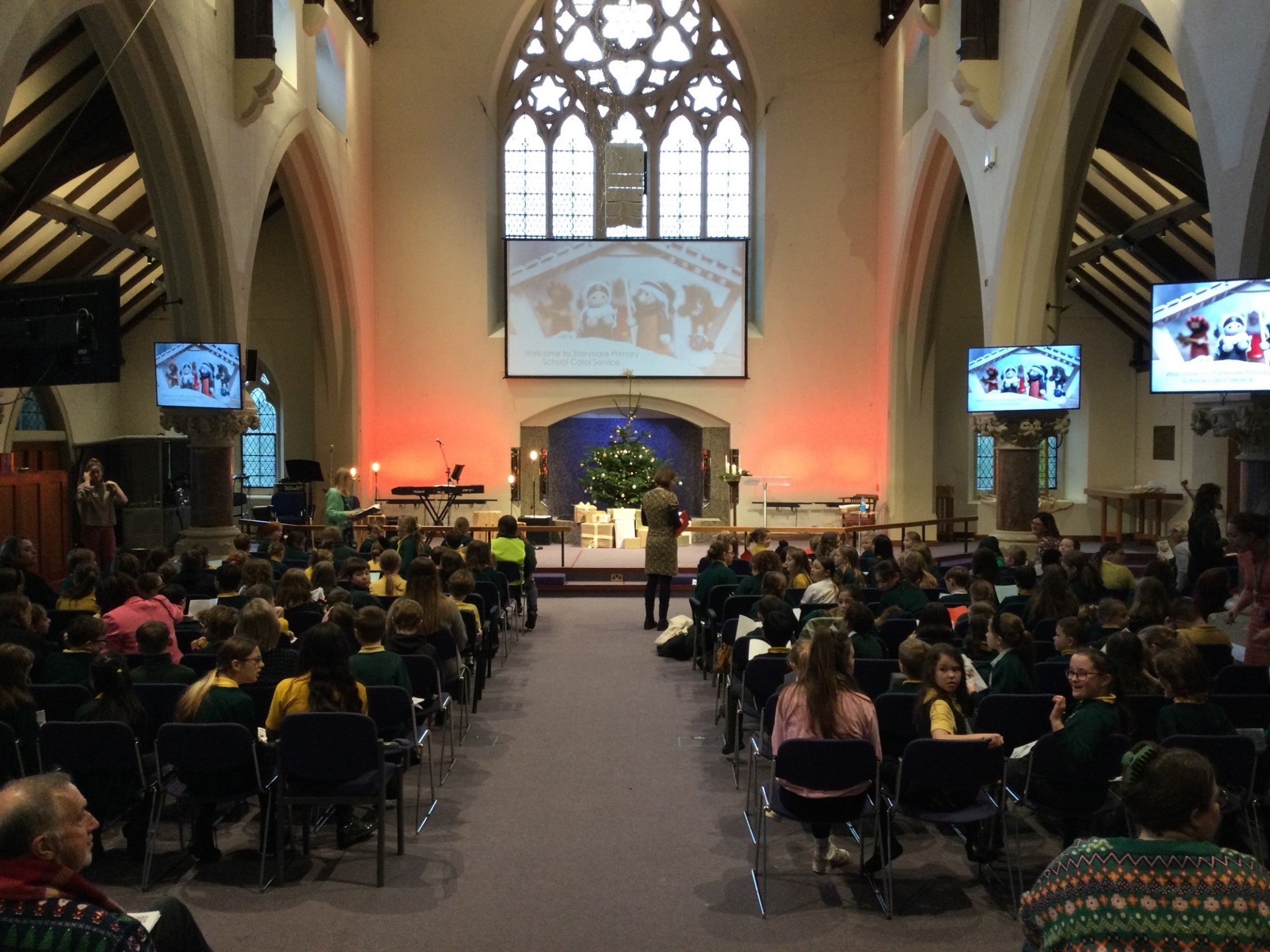
Religious Education
Intent
Appreciate, Participate, Innovate
Appreciate: The RE curriculum at Stanmore Primary School enables children to explore what it means to exist in the world so that they are able to appreciate the world around them, their own experiences and the ideas beliefs and values of others at the communicate and apply stage of the enquiry cycle.
Participate: The quality and variety of language heard, written and spoken are key factors in learning the meaning of important religious vocabulary (e.g. synagogue, ritual) and articulating religious concepts clearly and precisely. This language assists children to participate by making their thinking clear, both to themselves and others. Children are further supported to participate at the inquire and contextualise stage, through a range of rich experiences of visits, artefacts and visitors in each planned unit. Children are able to participate through collaborative discussion, questioning and reflection.
Innovate: Children’s knowledge and skills are then further deepened at the evaluate stage when they are invited and supported to consider the implication of the key concept in different contexts and to consider implications in their own lives and the lives of others. They are invited to innovate and apply their learning through a creative project or outcome.
Purpose of study
RE at Stanmore Primary School is taught through Living Difference IV, the agreed syllabus for religious education in Hampshire, the Isle of Wight, Portsmouth and Southampton.
We seek to introduce children and young people to what a religious way of looking at and existing in the world may offer in leading one’s life, individually and collectively.
Living Difference recognises and acknowledges that the question of what it means to lead one’s life with such an orientation can be answered in a number of qualitatively different ways. These include the idea that:
to live a religious life means to subscribe to certain propositional beliefs (religion as truth);
the idea that to live a religious life means to adhere to certain practices (religion as practice);
to live a religious life is characterised by a particular way of being in and with the world: with a particular kind of awareness of and faith in the world and in other human beings (religion as existence).
These three ways of conceptualising religion also relate to different theological positions and may be found as overlapping to different extents within any particular religious tradition.
Religious education in Hampshire, Portsmouth, Southampton and the Isle of Wight intends to play an educative part in the lives of children and young people as they come to speak, think and act in the world.
This approach to religious education in Hampshire, Portsmouth, Southampton and Isle of Wight schools is consistent with the United Nations Convention on the Rights of the Child, particularly Articles 12, 13, 14 and 30, and supports the work of rights respecting education (RRE).
Aims
The aim of the RE curriculum at Stanmore Primary School is to promote reflection, empathy, comprehension and interpretation of world beliefs and to acquire and develop knowledge and understanding of Christianity and two other principal religions represented in our school and wider community; Hinduism, Judaism, and Islam.
RE teaching at Stanmore Primary School aims to foster attitudes such as curiosity, open-mindedness, tolerance, wonder, appreciation, respect and self-understanding through the Hampshire ‘Living Difference IV’ agreed syllabus.
Through a coherently planned and well-sequenced curriculum, teachers bring children and young people first to attend to their own experience and that of others, to engage intellectually with material that is new and to discern with others what is valuable with regard to living a religious life or one informed by a non-religious or other perspective.
How is this subject planned?
Schools are required to teach RE, but it isn't part of the National Curriculum; this means that, although the government provide guidance on what to teach and the aims of learning about RE, these are non-statutory. At Stanmore we use Living Difference IV
Living Difference IV is the legal document to be followed for the teaching of religious education in Hampshire, the Isle of Wight, Portsmouth and Southampton schools.
Living Difference IV is informed by current educational research, as well as research into religion and worldviews, it builds on the approach to religious education used in Hampshire, Portsmouth and Southampton since 2004.
Living Difference IV offers a set of principles for teachers on which we have designed our curriculum to ensure religious education is open to the plurality of ways in which people live in our local, national and international communities.
At Stanmore we follow the recommended following minimum hours for the teaching of RE. This may be taught over a half term project or as a blocked unit:
EYFS classes: approximately 36 hours per year
Key Stage 1: 36 hours per year
Key Stage 2: 45 hours per year
RE is taught through subject specific projects. The cycle of enquiry: apply, communicate, evaluate, contextualise, inquire is used in the EYFS and through KS1 and KS2 used to underpin teaching
Where appropriate, there is interconnection between RE and other subjects, for example art. The purpose of this is to connect new knowledge with existing knowledge. Pupils also need to develop fluency and unconsciously apply their knowledge as skills.

Implementation
The Stanmore Approach
Religious Education at Stanmore Primary School, is taught through a conceptual enquiry exploring concepts common to all people, shared between many religions or distinctive to one religion. The carefully sequenced and precise curriculum ensures that children engage with concepts specific to and shared across world religions including Christianity, Islam and Hinduism. The Golden Thread concepts of community, belonging, special and love, thread through the curriculum to ensure continuity across key stages.
BEST Values and Keys for Success
The Stanmore values of belonging, excellence support and trust are closely aligned to the enquiry concepts explored through the RE curriculum. The children’s understanding of what it is to ‘belong’ is enhanced through the exploration of religious beliefs and practices. Children are encouraged to support and trust each other as they work collaboratively, whilst developing the skills of persistence and cooperation, throughout the enquiry cycle. We recognise that children will be reflecting on their own unique experiences which can be shared in a supportive and trusted environment. Through rich experiences of visitors and visits, children are encouraged to develop confidence and organisation by asking questions and interpreting and presenting information. The RE curriculum is underpinned by the key of respect; respect for each other, perspectives and viewpoints.
Inclusion
Religious Education (RE) is a subject that celebrates diversity within religious and non religious worldviews. It encourages discussion about equality, human rights, justice and individuality. These inclusive ideas are affirming not only for the learner with special educational needs, but also for the whole class.’ (NASEN: 2024)
The RE curriculum is planned to be precise and appropriately adapted and meet the needs of all learners. Every child is entitled to an RE curriculum, that is adapted to meet their individual needs and allows them to be successful. Teachers consider the barriers of the individual children and the key learning of each lesson; identifying the specific new learning. Teachers consider how to:
present new vocabulary with accompanying images to help embed specialist vocabulary
Break down ideas into bite size pieces which a learner can master before moving onto the next idea.
Make links between topics and lives of learners
Use photographs, video clips and artefacts to help learners visualise and understand practices which may be outside of their day to day experience
Focus learner’s attention on the new content ensuring that all children are able to communicate their ideas and beliefs through the arts and technology.
SMSC and British Values
RE at Stanmore Primary School supports and promotes spiritual development by providing opportunities to discuss and reflect on key questions of truth, experiences and beliefs and by considering how beliefs and concepts in a religion can be expressed creatively. The RE curriculum supports moral development through the exploration of moral issues and choices, including justice, race and religious respect. The RE curriculum supports and values diversity by engaging in issues such as truth, justice and trust. Social development is supported by considering how religious and non-religious ways of life lead to particular actions and concerns, recognising the diversity of viewpoints and perspectives between religious and non-religious ways of life. Cultural development is supported through a range of experiences such as encounters with people, literature, the creative and expressive arts, and resources from differing cultures.
Oracy
We encourage children to ask questions and discuss their learning and ideas using ‘agree, build challenge’ (ABC) to enable the teacher to build on and extend children’s thinking. We encourage children to share their ideas, in full sentences, with peers to support their understanding of the new vocabulary taught.

Impact
How is this subject assessed
Teachers use assessment to improve learning and making judgements about childrens’ work in relation to the newly revised RE syllabus Living Difference IV.
Assessment of RE is reported to parents in the annual report.
How is this subject monitored
The subject leader is responsible for monitoring the planning, teaching and assessment of the subject. This is triangulated through book looks, pupil conferencing, learning walks and discussions with teachers
Governors carry out regular monitoring visits in school and update the Full Governing Body through Governor Visit reports.
Pupil Voice

Year R
Autumn
Theme: Belonging
Concept: All about me
Theme: Christmas - Jesus’ birth
Concept: Celebrating Birth
Sping
Theme: Special People - Jesus and special people for children
Concept: Special
Theme: Eggs as a sign of New Life
Concept: Reminder/Symbol of new life
Summer
Theme: Special clothes
Concept: Special
Theme: Transition
Concept: Looking Forward
Year 1
Autumn
Christianity/Judaism
Theme: Celebrating Harvest
Concept: Thankfulness
Christianity/Judaism
Theme: Advent/Hannukah
Concept: Light as a symbol
Spring
Judaism
Theme: Remembering
Concept: Passover
Christianity
Theme: Palm Sunday
Concept: Welcoming (Community)
Summer
Judaism
Theme: Belonging in Judaism
Concept: Belonging
Christianity
Theme: Events in Jesus’ Life
Concept: Authority
Year 2
Autumn
Christianity
Theme: Bread as a symbol
Concept: Symbol
Christianity
Theme: Nativity
Concept: Journeys
Spring
Christianity
Theme: People Jesus met
Concept: Belonging
Christianity
Theme: Key Events of Easter
Concept: Love as sad and happy
Summer
Judaism
Theme: Special Books (Bible and Torah)
Concept: Special
Judaism
Theme: Shabbat
Concept: Remembering
Year 3
Autumn
Hinduism
Theme: Hindu Worship
Concept: Devotion (Love)
Christianity
Theme: Angels
Concept: Angels
Spring
Hinduism
Theme: Holi
Concept: Good and Evil
Christianity
Theme: Easter
Concept: Changing Emotions (Love)
Summer
Hinduism
Theme: Generosity (dāna)
Concept: Community
Christianity
Theme: Jesus’ Teachings and Message
Concept: Messages
Year 4
Autumn
Christianity
Theme: Making choices
Concept: Temptation
Christianity
Theme: Holy Mary, Mother of God
Concept: Holy (Special)
Spring
Christianity and Hinduism
Theme: Places of worship
Concept: Sacred Place (Special)
Christianity
Theme: Easter and the Paschal candle
Concept: Ritual
Summer
Christianity and across religions
Theme: Stones as a symbol
Concept: Symbol
Hinduism
Theme: Raksha Bandan
Concept: Protection (Love)
Year 5
Autumn
Christianity
Theme: Religious Stories
Concept: Justice
Christianity
Theme: The Two Birth narratives
Concept: Interpretation
Spring
Christianity and Islam
Theme: Place of worship
Concept: Sacred (special)
Christianity
Theme: Jesus the Law Breaker
Concept: Laws
Summer
Islam and Christianity
Theme: Sacred Texts
Concept: Wisdom
Islam
Theme: The Journey of Life
Concept: Rites of Passage (Belonging)
Year 6
Autumn
Islam
Theme: What it means to live life as a Muslim
Concept: Belonging
Christianity
Theme: The Magi
Concept: Warning
Spring
Christianity
Theme: Creation
Concept: Stewardship (Love)
Christianity
Theme: What happened next?
Concept: Resurrection
Summer
Islam
Theme: What does it mean to live life as a Muslim?
Concept: Umma (Community)
Islam
Theme: Ramadan and Eid Al Fitr
Concept: Ritual
